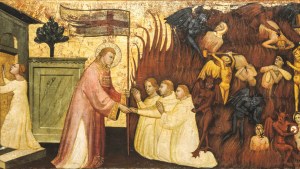A beloved media priest often said that he was “aiming for purgatory” when he died. In humorous response, another noted priest once said, “That’s bad ballistics. If you want to hit the target, you must aim higher.”
Purgatory has been the topic of jokes for centuries inside and outside Catholic circles, as well as the cause for serious contemplation on sin and its consequences. We’ve all heard of Dante’s Purgatorio and the momentous suffering souls undergo there, but how often do we think about purgatory in personal terms? After all, you and I – like the good priest quoted above – might wind up in purgatory on our way to heaven.
We might as well take a few moments now to consider what we could be in for.
This inquiry is especially relevant as we celebrate two important feasts after Halloween: All Saints Day (November 1), when we pray for the intercession of the many souls already in heaven, those who are canonized and saints not officially recognized by the Church; and All Souls Day (November 2), when we pray for the holy souls in purgatory, that they may soon enter heaven.
With these days in mind, here are a few points to consider:
1This battle is won
The first thing to know about purgatory is that every soul who goes there is assured of heaven. The strife is over, the battle won for those in purgatory; that’s why we call them “holy souls.” All that’s needed is final cleansing from any attachment to venial sin, or imperfect contrition, or negative thoughts, or self-destructive tendencies, and then these souls are ushered into heaven.
2More real than 'no pain no gain'
Purgatory is a very practical part of God’s very real mercy. So put aside images of souls in purgatory walking as flames in a dark dungeon, and think instead of a state of deep interior cleansing with steps leading to glorious light. We willingly undergo suffering and delay gratification for earthly goods such as physical fitness, college degrees, or better-paying jobs, so we should expect that the highest prize of heaven would come with some preparation.
The word purgatory comes from the Greek for “fire,” as in purification. And purity is the point. As the recently canonized St. John Henry Newman wrote, since nothing impure can see the face of God and live, it is a work of mercy that souls undergo in purgatory. They are being prepared to contemplate the face of the Almighty and live in his presence forever.

Read more:
The saints tell us what Purgatory is actually like
3A certainty to rest in
You may think that this is all very nice, but nothing more than a pious legend. After all, most non-Catholic Christians do not profess a belief in purgatory. Well, rest assured, prayer for the dead is recommended in the Bible (2 Macc 12:46), and the existence of purgatory is a defined doctrine of our Catholic faith.
The Catechism of the Catholic Church states: “All who die in God’s grace and friendship, but still imperfectly purified, are indeed assured of their eternal salvation; but after death, they undergo purification, so as to achieve the holiness necessary to enter the joy of heaven” (#1030).
4Worth praying for
A good way to pave our way to eternity is to pray now for the souls in purgatory, and teach our children to do the same, so these souls may pray for us after we depart this life.
Have you ever scheduled a Mass for the soul of a deceased loved one – parents, siblings, other relatives or friends? Or are you part of a group that does so, such as the Knights of Columbus, which has a Mass offered each weekday for deceased members? Perhaps one day, as you enter heaven, a loved one will greet you with the words, “Thank you for your prayers!”

Read more:
What are Gregorian Masses for the dead?

Read more:
Benedict XVI’s teaching on purgatory
~
About the Author
Brian Caulfield works at the headquarters of the Knights of Columbus, where he is editor of knights.net and Fathers for Good.

